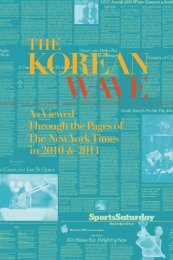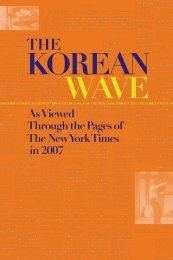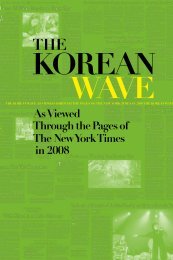The Korean Wave 2006 - Korean Cultural Service
The Korean Wave 2006 - Korean Cultural Service
The Korean Wave 2006 - Korean Cultural Service
You also want an ePaper? Increase the reach of your titles
YUMPU automatically turns print PDFs into web optimized ePapers that Google loves.
<strong>The</strong> New York Times, wednesday, september 27, <strong>2006</strong><br />
e8<br />
98<br />
As Boo-Seng stands rigid, unable to face the next moment,<br />
Jerry gently prods him: “Mr. Lee? I have to be at<br />
another office by 4. Let’s go.”<br />
Pulled from his reverie, Boo-Seng mechanically replies:<br />
“Yes. Let’s go.”<br />
That everyday phrase is used with resourceful cunning<br />
by Ms. Cho throughout “Durango,” accruing new resonance<br />
with each repetition. She has a gift for imbuing<br />
homely details with a just perceptible varnish of poetic<br />
feeling. Someone in the play is always impatiently saying<br />
“let’s go” to someone else, but all three of the Lee men<br />
are revealed to be painfully aware of their own tendency<br />
to stand stock still, emotionally speaking. <strong>The</strong> road trip<br />
that provides the dramatic impetus of “Durango” may<br />
be a near-cliche, but it is nevertheless an apt metaphor<br />
for a drama that gently contemplates how hard it can be<br />
to move forward in life, even when you can see the right<br />
road stretching out before you.<br />
Returning home, Boo-Seng interrupts the silence over<br />
dinner to announce gruffly that it’s time for a family vacation.<br />
“I have some time off,” he explains. This excites<br />
Jimmy, who has experienced little family togetherness<br />
since the death of his mother some years ago. But Isaac,<br />
broody and uncomfortable, would rather stay at home.<br />
He has to be blackmailed into going by Jimmy, who wins<br />
him over by giving him a peek at his secret notebook,<br />
where he defeats his anxieties by proxy through the exploits<br />
of comic strip superheroes.<br />
Although he bores the boys with an enthusiastic pep talk<br />
about <strong>Korean</strong> history, Boo-Seng has never learned the<br />
language of real communication. When the family stops<br />
at a motel for the night, he must unload his grief on a<br />
stranger by the pool. (In one of the play’s rare false notes,<br />
Boo-Seng moves a little too smoothly into a glib moment<br />
of self-reflection, wondering: “Why did I want so little?<br />
Where did I learn to want so little for myself?”)<br />
All three of the Lee men are struggling with a secret, and<br />
the play ultimately settles into predictable emotional and<br />
dramatic grooves. Both boys’ lives have been shaped by<br />
their father’s unspoken disappointment in his own, and<br />
his determination that they stick to the standard formula<br />
for achievement in America. Isaac confesses to his brother<br />
that he never really showed up for his med-school interview<br />
in Hawaii. Jimmy confides that he actually hates<br />
swimming. Looming ahead like an Applebee’s on the<br />
roadside, familiar to the point of banality, is another dark<br />
secret, the big H: homosexuality.<br />
Thankfully, the well-worn contours eventually give<br />
way to a few unexpected kinks and crannies. And the<br />
unadorned performances are pleasing, with Mr. Saito<br />
etching a quietly moving portrait of a man quietly coming<br />
to terms with the knowledge that his sacrifice may<br />
never yield the satisfactions he had hoped for. Mr. Yew,<br />
a playwright himself, has a graceful sense of pacing, and<br />
the production is uncommonly well designed. Daniel<br />
Ostling’s sets, gently lighted by Paul Whitaker, contrast<br />
the cramped spaces of the men’s lives with the freedom<br />
of the road.<br />
And despite the schematic flaws of her plot, Ms. Cho<br />
wisely resists the kind of feel-good ending that would<br />
wrap up a movie on a heartwarming note. <strong>The</strong> voyage of<br />
the Lee men may take them through some unexpected<br />
emotional territory, but they end where they began, retreating<br />
into comfortable isolation, the fragile shoots of<br />
new feeling between them abandoned, at least for now.<br />
DURANGO<br />
By Julia Cho; directed by Chay Yew; sets by Dan Ostling; costumes<br />
by Linda Cho; lighting by Paul Whitaker; original songs by<br />
Julia Cho; sound and additional music by Fabian Obispo; production<br />
stage manager, Buzz Cohen; interim general manager, Seth<br />
Shepsle; associate artistic director, John Dias; associate producers,<br />
Peter DuBois and Mandy Hackett; director of production, Ruth<br />
E. Sternberg. Presented by the Public <strong>The</strong>ater, Oskar Eustis, artistic<br />
director; Mara Manus, executive director; in association with<br />
the Long Wharf <strong>The</strong>ater, Gordon Edelstein, artistic director; Joan<br />
Channick, managing director. At the Public <strong>The</strong>ater, 425 Lafayette<br />
Street, at Astor Place, East Village; (212) 967-7555. Through Dec.<br />
10. Running time: 1 hour 3 minutes.<br />
WITH: Ross Bickell (Ned/Jerry), James Saito (Boo-Seng Lee), Jon<br />
Norman Schneider (Jimmy Lee), Jay Sullivan (Red Angel/Bob)<br />
and James Yaegashi (Isaac Lee).<br />
Laugh Now.<br />
You May Not<br />
When <strong>The</strong>se Women<br />
Rule the World.<br />
<strong>The</strong> best parodies start with great titles. So Young<br />
Jean Lee’s hysterically funny “Songs of the<br />
Dragons Flying to Heaven,” now at the Here<br />
Arts Center, is perfect, because the show is actually about<br />
minority rage, mudfish in tofu, femininity’s inner viciousness<br />
and a secret <strong>Korean</strong> plot to rule the world.<br />
“You may laugh now, but remember my words when you<br />
and your offspring are writhing under our yoke,” says<br />
Becky Yamamoto as the young woman known only as<br />
<strong>Korean</strong>-American.<br />
Ms. Yamamoto is priceless, having already set the politically<br />
incorrect tone with the opening line, “Have you ever<br />
noticed how most Asian-Americans are slightly braindamaged<br />
from having grown up with Asian parents?”<br />
After a few more shockingly racist comments, she points<br />
out that some American men “like that retarded quality.”<br />
Ms. Yamamoto’s contemporary outspokenness is nearly<br />
equaled by the behavior of the three pretty, giggling<br />
<strong>Korean</strong> dancers in brightly colored traditional dresses.<br />
<strong>The</strong>y speak in <strong>Korean</strong> much of the time, but audiences<br />
will notice that the word “sex” comes up quite often.<br />
By ANITA GATES<br />
In English, one of the women perkily suggests to the others,<br />
“Shall we play ‘hookers and johns’?” More than once,<br />
a particularly young dancer announces with a demure<br />
smile that being a prostitute is fun. Later the three women<br />
(Jun Sky Kim, Haerry Kim and Jennifer Lim) take turns,<br />
with the potent gruesome humor of a Quentin Tarantino<br />
movie, miming horrible ways to commit suicide.<br />
Now and then a white American couple (Juliana Francis<br />
and Brian Bickerstaff) appear, arguing about sex, alcoholism,<br />
petty theft and their relationship in general. In<br />
the middle of this Mr. Bickerstaff’s character announces:<br />
“You know what’s awesome? Being white.”<br />
But Ms. Lee’s play, which she also directed brilliantly,<br />
is not only about that sort of supposedly ingenuous extreme.<br />
Just when the largely Caucasian audience thought<br />
it had caught up to Ms. Lee’s off-and-on ironic point<br />
of view, she called our bluff again. Whites are bigoted,<br />
Asians are bigoted, everybody’s bigoted, and isn’t it great<br />
that it’s all out in the open now, and we can laugh about<br />
it? But not really.<br />
“Songs of the Dragons Flying to Heaven” continues through Oct. 14<br />
zat Here Arts Center, 145 Avenue of the Americas, at Dominick<br />
Street, South Village; (212) 352-3101 or www.here.org.<br />
99<br />
Copyright © <strong>2006</strong> by <strong>The</strong> New York Times Co. Reprinted with permission.<br />
Copyright © <strong>2006</strong> by <strong>The</strong> New York Times Co. Reprinted with permission.





